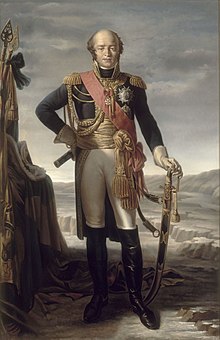Our website is made possible by displaying online advertisements to our visitors.
Please consider supporting us by disabling your ad blocker.
Louis-Nicolas Davout
Marshal of the Empire Louis-Nicolas Davout Prince of Eckmühl, Duke of Auerstedt | |
|---|---|
 | |
| Minister of War of the Hundred Days Empire | |
| In office 20 March 1815 – 9 July 1815 | |
| Monarchs | Napoleon I Napoleon II |
| Preceded by | Henri Jacques Guillaume Clarke |
| Succeeded by | Laurent de Gouvion Saint-Cyr |
| Governor-general of the Duchy of Warsaw | |
| In office 15 July 1807 – 1809 | |
| Mayor of Savigny-sur-Orge | |
| In office 8 October 1822 – 1 June 1823 | |
| Personal details | |
| Born | 10 May 1770 Annoux, France |
| Died | 1 June 1823 (aged 53) Paris, France |
| Resting place | Père Lachaise Cemetery |
| Children | 8 |
| Awards | Legion of Honour |
| Signature | |
| Nickname | The Iron Marshal |
| Military service | |
| Allegiance | |
| Branch/service | Army |
| Years of service | 1788–1815 |
| Rank | Marshal of the Empire |
| Commands |
|
| Battles/wars | See battles |
Louis-Nicolas d'Avout (French pronunciation: [lwi nikɔla davu]; 10 May 1770 – 1 June 1823), better known as Davout, 1st Prince of Eckmühl, 1st Duke of Auerstaedt, was a French military commander and Marshal of the Empire who served during both the French Revolutionary Wars and the Napoleonic Wars. His talent for war, along with his reputation as a stern disciplinarian, earned him the nickname "The Iron Marshal" (Le Maréchal de fer). He is ranked along with Marshals André Masséna and Jean Lannes as one of Napoleon's finest commanders.[1][2] His loyalty and obedience to Napoleon were absolute. During his lifetime, Davout's name was commonly spelled Davoust - this spelling appears on the Arc de Triomphe and in much of the correspondence between Napoleon and his generals.
- ^ "Louis Davout". Napoleonic Guide. Retrieved 28 July 2015.
- ^ Chandler, David G. (1987). Napoleon's Marshals. p. 94. MacMillan, New York.
Previous Page Next Page


